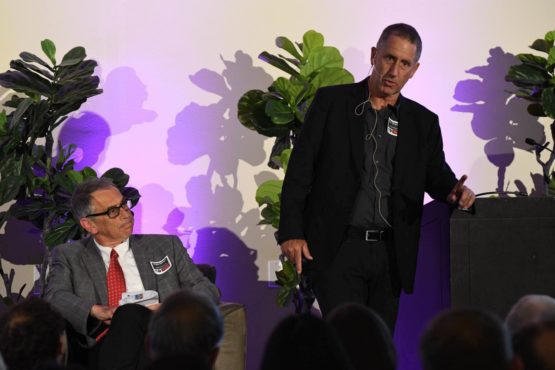At Stanford, experts explore artificial intelligence’s social benefits
Experts from Stanford and elsewhere talked about the future of artificial intelligence in society as part of the Global Entrepreneurship Summit.

Professor Russ Altman, left, and Professor Emeritus Yoav Shoham are members of a study group that will take a very long-term look at artificial intelligence. The two scientists were among the participants in a event looking at artificial intelligence’s social benefits at Stanford on Thursday. (Image credit: Krista Victoria Chew)
As artificial intelligence emerges from science fiction to everyday life, the power to shape and direct this world-changing technology remains within society’s reach.
That overarching theme animated a crowd of more than 300 people at a Stanford event Thursday evening. The discussion was titled, “The Future of Artificial Intelligence: Emerging Topics and Societal Benefit.”
The four-hour-long discussion featured 15 speakers from government and academia, and was one of many tech-orients events being held on the Stanford campus this week as part of a Global Entrepreneurship Summit, hosted by the United States government. The summit includes a scheduled Friday morning appearance by President Barack Obama.
The Future of AI panel was co-chaired by Stanford faculty members Russ Altman, a professor of bioengineering and medicine, and Fei-Fei Li, an associate professor of computer science.
Altman opened the event on a lofty note, citing the value that AI would have in his fields of medicine and biological discovery, then became playful in welcoming keynote government speaker Megan Smith, the United States Chief Technology Officer in the White House Office of Science and Technology Policy.
“Is that not the coolest job title ever?” Altman quipped.
Smith touched on how government is using artificial intelligence, machine learning and similar techniques in tasks ranging from planning space missions to forecasting job growth. But given the potential effects of these technologies on culture and the economy, she said government’s larger challenge is to bring “humanity’s greatest talent” to bear on the development and direction of AI by throwing open the discussion.
“How are we going to make sure we are bringing everyone into this conversation?” Smith asked, previewing an initiative that the White House is expected to formally announce Monday that will offer literally anyone a way to register an opinion or view on this emerging technology.
Li, who followed Smith to the podium, also hit on the theme that AI’s direction would depend on who stands up to computer science. “Will AI become the force of destruction or the hope we have for tomorrow?” she asked rhetorically, saying the answer would depend in part on broadening gender diversity in computer science. “The future of AI is in the hands of those who make AI,” she said.
Thursday’s panel was co-hosted by the Stanford 100 Year Study on the Future of Artificial Intelligence, also known as AI 100. Several members of this new scholarly study group took part in a panel discussion at Thursday’s event, where they discussed their long-term goal of producing a series of detailed reports on subtopics within the broader field of artificial intelligence.
Speakers from this AI 100 group Thursday included Harvard Professor Barbara Grosz, who said the executive summary of the group’s first report titled, “Artificial Intelligence and Life in 2030,” would focus on everyday applications on AI in urban environments – on things like transportation, public safety and low-income communities.
“We wanted to ground this study in real life,” Grosz said, and offer not just technological but legal and sociological context to help “shape the outcomes of these technologies.”
The event was livecast on the Stanford Engineering Facebook page, where talks from all 15 speakers will remain available at https://www.facebook.com/stanford.engineering.
